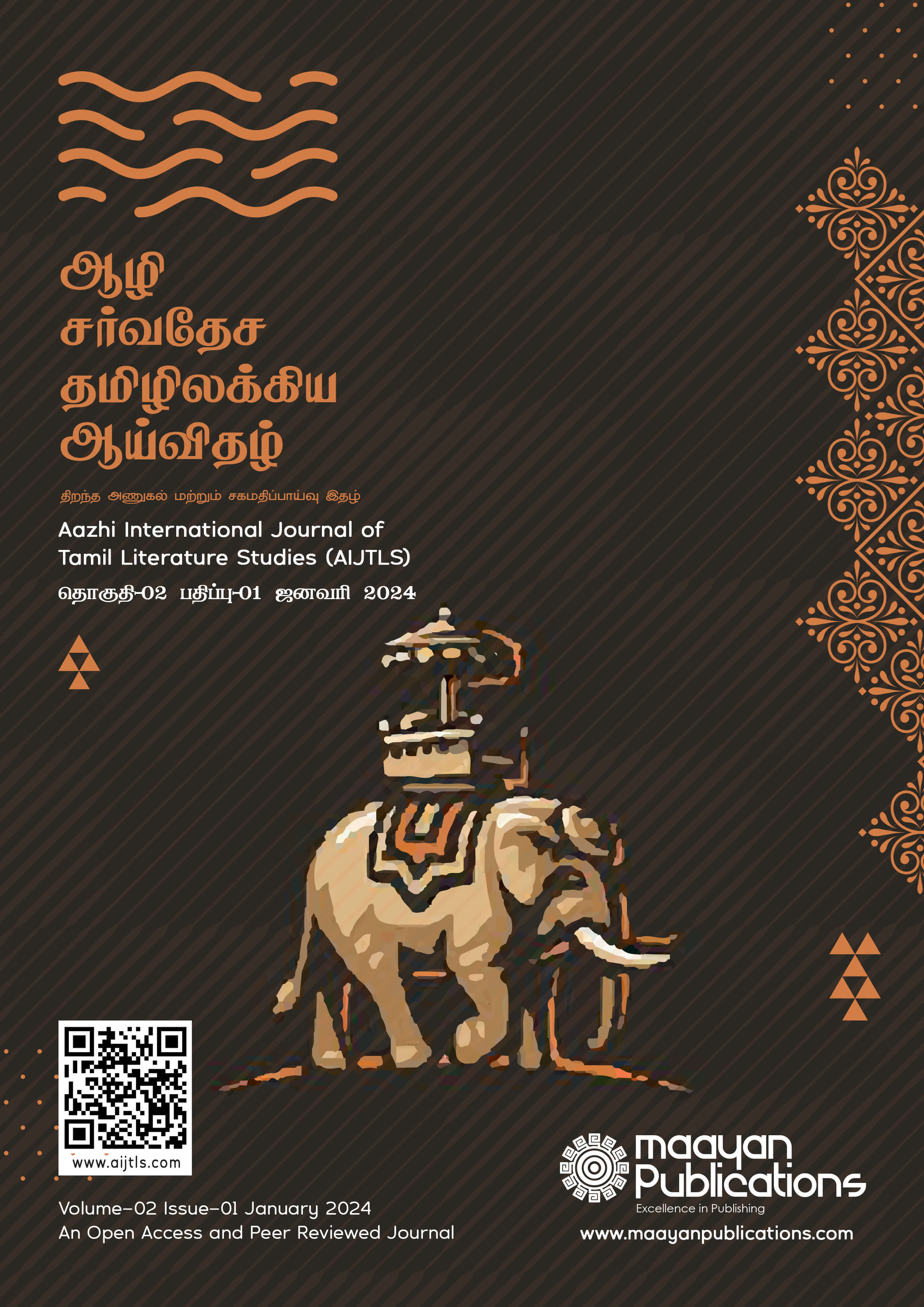நடப்பு பதிப்பு | Current Issue

தொகுதி 2 பதிப்பு 1 (ஜனவரி 2024)
Volume 2 Issue 1 (January 2024)
Aazhi International Journal of Tamil Literature Studies (AIJTLS) employs a double-blind peer review of all submitted manuscripts, which means that both the reviewer and author identities are concealed from the reviewers, and vice versa, throughout the review process. A more in-depth description of our peer review process is below.
Initial In-house Assessment Stage
When the manuscript arrives at the editorial office of the journal, the editor-in-chief carries out an initial in-house assessment of the received manuscript based on the suitability of the topic according to the journal’s aims & scope, the author’s adherence to the journal’s guidelines (word count, language clarity, and format), research quality, the importance of the topic and relevance to the journal’s readership. If the manuscript does not pass these initial checks, the author will be contacted to revise the manuscript according to the journal criteria; however, the editor-in-chief might reject the manuscript immediately. Rejected manuscripts at this stage have serious flaws, are insufficiently original, have poor language, or do not fall within the aims and scope of the journal.
Authors whose manuscripts are rejected at this stage will be informed directly. This rejection can enable a fast decision if the manuscript is not suitable for the journal, enabling the author(s) to submit the paper to another journal quickly.
Plagiarism Check
Manuscripts submitted must be free from plagiarism content. All authors are suggested to use plagiarism detection software to do the similarity checking. Editors will also check the similarity of manuscripts by using leading plagiarism-detection tools.
Peer Review Stage
The Peer-review process is an essential part of the publication process; it definitely improves the quality of the article to be published. Peer review ensures an independent assessment and accuracy of the results described. With the collaboration of editors and reviewers, the Aazhi International Journal of Tamil Literature Studies (AIJTLS) can ensure that the manuscripts we publish are among the most important in their respective disciplines. Aazhi International Journal of Tamil Literature Studies (AIJTLS) administers an effective review system. Our Peer review is designed to choose technically valid research of significant interest. Our Referees are expected to find the flaws and request suggested advice to improve the quality of the article to be published. Our peer reviewer can only evaluate what the authors chose to include in the manuscript. Through this publication approach, our peer review process will identify fraudulent data before publication. All contributions submitted to the Aazhi International Journal of Tamil Literature Studies (AIJTLS) that are selected for peer review are sent to at least one, but usually, two independent reviewers, selected by the editors. The editor’s decision on the choice of referees is final. Editors, authors and reviewers are required to keep confidential all details of the editorial and peer review process on submitted manuscripts. The peer review process is confidential and conducted anonymously; the identities of reviewers are not released. Reviewers must maintain the confidentiality of manuscripts.
Final Decision Stage
At this stage, the editor will look through the resubmitted manuscript to make sure that the author(s) has revised the manuscript in response to the reviewers’ comments. At this stage of the final decision, the author(s) may be required to make further revisions, or the manuscript might be rejected if the author(s) did not adequately carry out the revisions suggested by the reviewers.
Copyediting, Layout Editing and Proofreading Stage
Once the manuscript is accepted by the editorial team, it will undergo a copyediting, layout editing and proofreading process to ensure the linguistic quality of the manuscript. After the editing stage is finished, authors are requested to double-check the PDF file of the final version before online publication.
Publication of accepted articles including assigning the article to the published issues will be made by Editor-in-Chief by considering the sequence of accepted dates and geographical distribution of authors as well as a thematic issue.
நடப்பு பதிப்பு | Current Issue

தொகுதி 2 பதிப்பு 1 (ஜனவரி 2024)
Volume 2 Issue 1 (January 2024)
இதழின் முக்கிய விவரங்கள்
வெளியீட்டு வகை: மின் அச்சு
இதழின் பிரிவு: சங்க இலக்கியம், நீதி இலக்கியம், பக்தி இலக்கியம், காப்பிய இலக்கியம், சிற்றிலக்கியம்
வெளியீடு: அரையாண்டு இதழ் (ஜனவரி, ஜூலை)
மொழி: தமிழ்
கட்டுரை செயலாக்க கட்டணம் (APC): இலவசம்
வெளியீட்டாளர்: மாயன் பதிப்பகம்
வெளியீட்டு வழிகாட்டுதல்கள்: COPE வழிகாட்டுதல்களைப் பின்பற்றி
திறந்த அணுகல்: வாசகர்களுக்கு இலவச அணுகல்
மதிப்பாய்வு செயல்முறை: இரட்டை குருட்டு சக மதிப்பாய்வு
வெளியீடு காலம் (சமர்ப்பிப்பு முதல்): திருத்த சுழற்சிகளின் அடிப்படையில் குறைந்தபட்சம் 60 நாட்கள்.
மின்னஞ்சல்: editor@aijtls.com
For More Details: Click Here
எங்களுடன் இணைய...
ஒரு ஆய்விதழின் ஆசிரியர் குழுவில் உறுப்பினராக (அ) மதிப்பாய்வாளராக இருப்பது உண்மையிலேயே பயனுள்ளது, இனிமையானது மற்றும் மதிப்புமிக்கது. இது தொடர்புடைய துறைகளில் நிபுணர்களால் வழங்கப்படும் வழிகள் மற்றும் வழிகாட்டுதல்கள் மூலம் ஆராய்ச்சி உலகில் தங்களை இணைக்க உதவுகிறது.
© 2023, ஆழி சர்வதேச தமிழிலக்கிய ஆய்விதழ் - Aazhi International Journal of Tamil Literature Studies (AIJTLS). Published by Maayan Publications.
